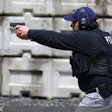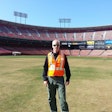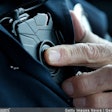The other day, while we drove past another city's park, my wife asked me what I was thinking about. Instead of looking at the green grassy glen to enjoy a day by the amphitheater, while listening to a concert or driving down a winding tree-lined path, I had other thought processes.
If I had to respond, could that hill be used for a medevac landing zone? Could I get fire apparatus down this narrow road to support a structural collapse of the theater? What are the positions of advantage in a shooting scenario? You get the idea.
This is called "constructive tactical thinking," and it's not daydreaming! As a young officer, you must remember that you're always playing for the visiting team. Rarely do the bad guys come to the precinct to commit a domestic assault or rob a lady at gunpoint in the police parking lot. We're always the visitors. When we do arrive, we must do an immediate size-up of the terrain and situation, often as it's evolving.
You should recall your tactical and range instructors repeatedly asking you to recite the difference between cover and concealment. Refresher: Cover stops incoming bullets, and concealment hides you from eyes, not bullets.
What separates recruits from wise, veteran street cops? You stop at cover and concealment; they don't. You've got to learn to read the terrain. Great military leaders from history were more adept at reading the topography of the area than brushing up on their tactics. Good positions for the troops improve poor tactics and equipment.
This doesn't mean I want you over-thinking the calls you ride. Zombies are not going to pop out of the dumpsters to eat your brain. But you must develop what some refer to as tactical thinking, or what I call "but, what if, then" thinking. You can never assume your radio dispatcher will give you all the tactical information. Some complainants don't know all of the good tactical intelligence we would desire to know. And yes, some bad guys will lie about this.
If you don't scan the area for additional people (friend and foe), you risk becoming a statistic. Learn to scan the area for cover and concealment, as well as things that could harm you. In every neighborhood, there's a snarly cur of a dog to bite you. Think with all of your senses; you were gifted with five of them, so use them.
As you gain more experience, you'll gain a patrol sixth sense that's not available on the internet with shipping and handling added. It's something that develops, and those who have it never quit developing it. Never rest on your past laurels; keep your mental and tactical edge sharp. One fatal mistake is lowering your guard on a repeat call. You know the one. Every weekend, you have to go tell the drunken husband to pipe down so the neighbors can get some sleep.
One call, one night, the drunk has consumed some fighting liquor and will take you on. Always consider this audible, even though you've played this team before. A good football team won't play this year's game with last year's game notes. They make adjustments, and you should too.
So when you're out, make critical tactical thinking a part of your everyday life. What you see in the daylight hours may offer insights at twilight. For some, this sounds like paranoia. Nope, the paranoid are those who worry about how they're going to lose. Prepared warriors are willing to invest the extra moments to win.
Related:

















